Pakistan’s Chief of Army Staff is in Saudi Arabia on a visit that is likely to focus on revival of the frozen financial and energy ties rather than Kashmir, which is no longer a priority agenda for countries belonging to the six nation Gulf Cooperation Council (GCC).
Bajwa has visited Riyadh essentially to lay the groundwork for the visit of the Pakistan Prime Minister Imran Khan that begins on Friday.
Kashmir is no longer on the front end of the twin visits. The six nation GCC, speared by Saudi Arabia, far from raking up the Kashmir issue, is instead, in a mood to work behind the scenes to encourage a thaw in ties between India and Pakistan. The United Arab Emirates has claimed that it has played an active role in decelerating New Delhi-Islamabad tensions. Both India and the Pakistan have revived their 2003 ceasefire agreement which could pave the way for broader talks, if Islamabad desists from cross-border terrorism across the Line of Control (LoC). Some analysts are of the view that the talks can move forward towards normalisation if India in turn takes some steps that Pakistan can “sell” to placate its domestic constituency.
#COAS General Qamar Javed #Bajwa Arrives in #Kingdom_of_Saudi_Arabia on An Official Visit.#PakistanSaudiArabiaFriendship
pic.twitter.com/PR15jOeWGc
— Siasi King (@KingSiasi) May 4, 2021
"Tensions have been dialled down between Pakistan and the Saudis, [and] the flow of investment could resume" Arif Rafiq, the president of Washington-based Vizier Consulting, told Nikkei Asia. "But Riyadh is unlikely to tilt back toward Islamabad on the Kashmir dispute."
Analysts say that talks between the Saudis and the Pakistani leadership is likely to focus on three specific issues.
First, revival of economic ties between the two countries is expected to top the agenda. The Saudis are interested in setting up a $10 billion refinery in Gwadar, which has so far remained stalled. The proposed mega oil city will be developed on 88,000 acres of land in the Gwadar district of the southwestern Balochistan province to refine and process petroleum products mainly imported from the Gulf region, for local and regional consumption, the Saudi daily Arab News reported in March.
Second, the Saudis want that if they are to normalise ties with Israel, following in the footsteps of fellow GCC partners, UAE and Bahrain, then Pakistan has a major role to play. Some analysts say that Saudi Arabia realises that if it recognises Israel, the loudest protest will be heard in an increasingly radicalised Pakistan. Consequently, it is in favour of Pakistan biting the bullet first, that is normalising its relations with Tel Aviv before Riyadh can do so. "The Saudis want to recognises Israel but cannot do so easily," James M. Dorsey, a senior fellow at the S. Rajaratnam School of International Studies in Singapore was quoted as saying. "If Riyadh recognises Israel, the biggest protest against the country will take place in Pakistan."
Third, cash-strapped Pakistan is desperate that it can once again access Saudi loans and grants, which had earlier stalled following a diplomatic spat between the two countries. In August last year, both the UAE and Saudi Arabia told Pakistan to repay $4 billion that had been loaned to Islamabad in 2018.
Bajwa’s visit may stoke the 1982 security cooperation agreement between the two countries, which allows stationing of Pakistani military advisers in Riyadh.





















